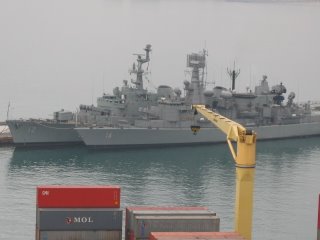
Iran is an ancient nation. It’s history parallels the development of modern civilization. It has a large population of well educated people and a variety of natural resources. It is also the present epicenter of all that is hostile to the West. It has learned from the three previous global conflicts and seeks to leverage these learnings in its fight with the West. I contend that North Korea is actually a proxy of
Iran, as is Syria. Despite the potential threat of North Korea, they have been under siege for so long that they are more akin to the violent, but unstable enforcer of a ruthless mob boss (Iran).
Iran has learned something from World War III. What a minute, you say you don’t remember World War III? It took place almost immediately after World War II. Let’s review for a moment, World War I was the global battle against fading Imperialism. It was quickly followed by World War II, which was the global battle against Fascism. It ended when regional powers in the East (Japan) and West (Germany / Italy) were defeated in a near cataclysmic conflict spanning the globe.
World War III was the global battle against Communism. It ended when the West (the United States) defeated the Union of Soviet Socialist Republics largely through economic power. In other words, we spent them into defeat. This is not to say that the war was not punctuated with conflict. Much of Africa, Latin and South America were embroiled in desperate proxy wars. Asia was fraught with conflict as regimes jockeyed to achieve positions aligned with either the USSR or the USA. Regimes which chose the latter prospered, those with the former (North Korea, China, Vietnam, Myanmar) did not.
So here we are in
World War IV. This is the global battle of the free world against ideo-religious extremists (largely represented by Islamofascists). It is marked by small conflicts and asymmetric warfare. It is not located to one theater of operations but in the realms of the shadow classes. It takes the form of rioting in France, civil war in East Africa, bombings in Indonesia and murderous assaults in India. This war, like so many others is a derivative of the unresolved issues of prior global conflicts.
This war is
different. World War I was won through the brutal defeat of enemy forces. Pure losses of blood and treasure. World War II was won through the defeat of the enemy’s ability to fight. Occupation of lands and destruction of their industrial base. World War III was won by the overwhelming of the enemy’s economic ability. The development of more costly weapons systems and strategies bankrupted the USSR. World War IV is a conflict of ideas. It can not be won through purely military or economic means. It must also be won through a liberating wave of ideas. The changes in the Arab world are good starts, voting in Kuwait, Iraq, Afghanistan. These nations needn’t adopt a USA style of democracy, but they must unchain the portion of their population who live as second class citizens (women, non-Muslims, etc.).
So what has Iran learned? It has learned that proxy forces can be just as effective as the marshalling of great forces. It has learned that the world is so interconnected economically, that only the gravest of crises would force military action against its own soil. It has learned that the fractured nature of global interests will insulate itself from action or criticism.
What must we learn to defeat this imminent
threat? The victory of a state like Iran will result in a further repression of the people of that region and an increasing balkanization globally. What will be the effect on the United States? Slight, in my opinion. We will leverage our technology and convert away from fossil fuels and reduce our energy dependency on imported oil. The tragedy will be the abandonment of a portion of the world which will continue to suffer under
regimes much worse than the Taliban. Our key learning should be to exploit the fragility of these behind the scenes actors and through careful action (including covert) undo their power bases.





